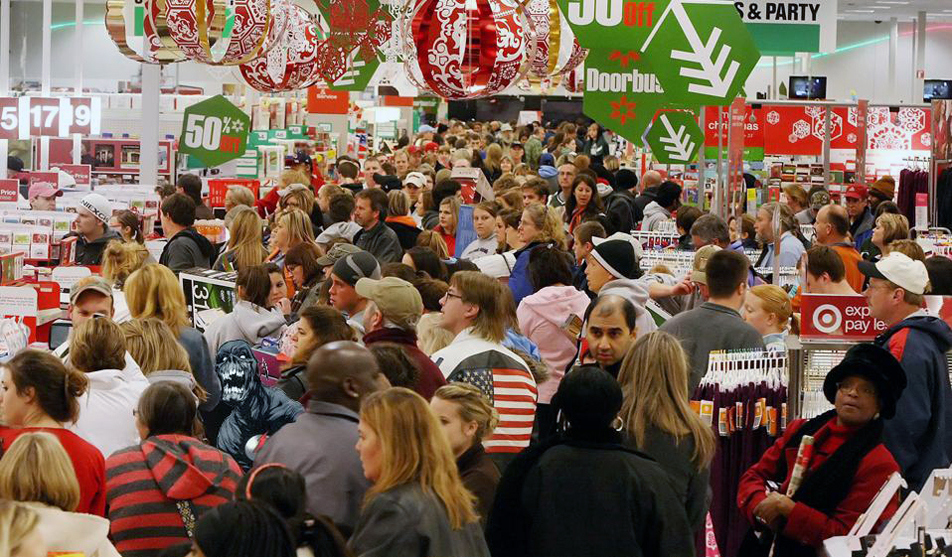I once read an essay by a white liberal — I believe this was in the New York Times — who felt compelled to demonstrate his compassion for African-Americans by declaring that he would never again have his shoes shined by a black man, because, in his mind anyway, this honest work is too demeaning. Forgetting for a moment that this could not possibly sound more elitist, does one really think that is the result that the shoe shiner would want? Not to be hired? To have to go home to his family and not put enough food on the table, and fall behind on the rent, and tell his children they can’t have clothes that fit, and to have to search for other work that would be even less appealing?
I often ruminate on this during holidays, and in particular Thanksgiving, which, for whatever reason, is unique in its ability to inspire a common refrain that people simply should not have to work that day. It is not “fair” (so says the virtue-bragging) that some businesses “force” their employees to work when everyone should have the day off. Thus, we are told, the rest of us should stay home and not shop, because then businesses will learn their lesson and close on Thanksgiving, and somehow the workers who need the money will be happier that way.
Thank goodness this has not caught on, or worse, been legislated into mandate, because few things could be more harmful to the working poor than to limit their ability to earn money.
Reducing the number of hours an employee works means they have less of their time to sell. Even if they are given “paid” time off, that just means the hours they work the rest of the year would be compensated slightly less in order to compensate them for the time they are being paid not to work. It’s really just deferred compensation, which does not increase one’s earnings, only delays them. No matter how you cut it, the formula is very simple: fewer hours worked equals less money earned.
Yes, you could delay your discretionary spending for a day, but that misses the point. The issue is not that the business will lose money on Thanksgiving by being closed that it can simply make up the next day, the issue is that the workers will lose the hours of labor that they could have been using to earn money, that cannot be made up. Once time passes, it’s gone. And though one could work extra hours to make up for those missed, that defeats the purpose of the day off in the first place, which is to give them more time off.
The only virtue of arguing that people “should not be forced to work on Thanksgiving” is that it is a cost-free way to demonstrate one’s compassion. At least, it is cost-free to the exhorter. But it is hardly compassionate to advocate for economic policies that lead to the financial harm of those for whom you are advocating, especially when those people are the most vulnerable. And to be clear, it is the poorest among us who are harmed the greatest by this mentality that it’s much better that people not earn the money that they need so that we can feel good about ourselves for being on their side.
Of course, this sort of argument is not popular (good economics tends to make for bad politics), and it will be reflexively called “anti-worker.” Nothing could be further from the truth. This essay is in defense of workers. Workers are harmed by reducing the demand for their services. If anything is “anti-worker,” it is this haughty “Work is gross! People shouldn’t work! Send them home and let them eat cake!” attitude of those who don’t have to work on holidays because they are so privileged that they do not need the money, and therefore don’t realize that the people working on holidays are doing so because they have to provide for themselves and their families.
Those of us fortunate enough not to need to work extra hours should stay out of the way of those who want the opportunity to work in order to improve their situation. But this is so typical of the Left. They think they’re helping workers by not shopping at their stores, thereby reducing the demand for their services and reducing the amount of money that they’ll make. They think they’re helping the poor by driving up the minimum wage and thereby causing more people to be unemployed. They think they’re helping the vulnerable by gifting them Obamacare, which causes employers to reduce hours and limit their hiring. They think they’re helping families by setting hourly limits on the amount an employee can work in a week, thereby taking away the right of workers to choose to work more and earn the money that they and their families need.
This is not helpful, and it is not compassionate. If you want to help the poor, go to the store and buy something so that these people can continue to earn money. They’ll be grateful, because they understand that working when others do not want to is not a punishment, it is an opportunity. The punishment is to deny them that opportunity.

